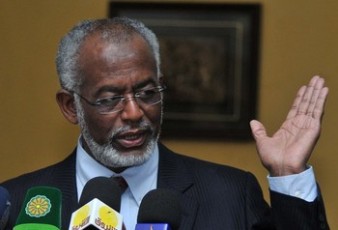Sudan FM hails AU decision not to refer Abyei dispute to UNSC
February 1, 2013 (KHARTOUM) – The Sudanese foreign minister Ali Karti today hailed as victory a decision by African Union (AU) summit last month to keep the dispute over Abyei between Khartoum and Juba in the African realm and not refer it to the United Nations Security Council (UNSC).

He noted that the AU gave the two countries up to three months in attempt to allow them to reach a compromise over the issue.
The top Sudanese diplomat went on to say that Africa is the warm bosom for Sudan that is appreciated and respected. He stressed that it is very important to deal prudently and wisely with Africa as Sudan has hosted a number of former and current African leaders.
Karti said it was necessary to open the door for dialogue even if Sudan had disagreements with African leaders.
Sudan’s relations with the AU was strained after the AU Peace and Security Council (AUPSC) backed the proposal made by the mediation team to hold a referendum in Abyei this year.
But under this initiative only those residing permanently in the area will be allowed to vote in the plebiscite and decide whether they want to join Sudan or South Sudan.
This proposal would effectively make the majority of voters come from the Dinka Ngok tribe, aligned with South Sudan thus putting the Arab Misseriya nomads, who spend several months in Abyei every year for grazing, at a disadvantage.
The mediators said that the exclusion of the Misseriya nomads comes in line with the decision of the Hague-based arbitration court, which defined the territory of the Ngok Dinka nine chiefdoms in July 2009.
The AUPSC expressed desire to see the UNSC endorse the plan but deferred the decision to the AU summit which took place in the Ethiopian capital last month.
But the AU members declined to heed to South Sudan calls for UNSC referral.
Abyei was to hold a referendum in January 2011 on whether it belonged with the north or South, but disagreement on who could vote stalled the ballot.
South Sudan and Sudan have been at loggerheads over a number of post-partition issues such particularly borders and oil.
South Sudan shut down its entire oil output of 350,000 barrels per day (bpd) a year ago after failing to agree export and transit fees with Khartoum.
Both countries agreed last September to set up a demilitarized buffer zone and resume oil exports from landlocked South Sudan through Sudan. Oil is vital to both economies.
But Sudan insists that oil exports will not resume unless security arrangements are agreed to on the borders.
Khartoum accuses Juba of backing Sudan People’s Liberation Movement-North (SPLM-N) rebels in South Kordofan and Blue Nile, two Sudan states bordering the South. Juba denies this.
In a related issue Karti called for the strengthening and encourage those in Juba government who have the desire to deal with Khartoum to establish sustainable political, economic and security relations.
(ST)
